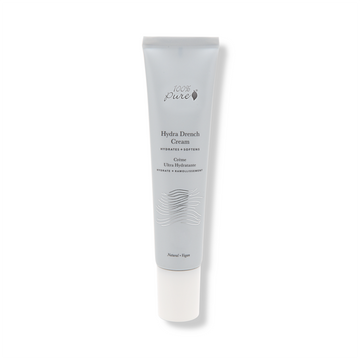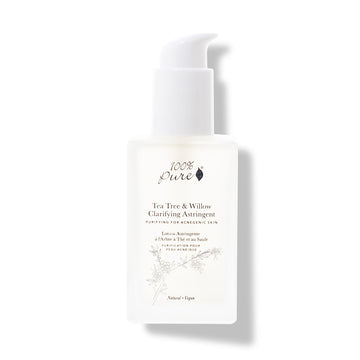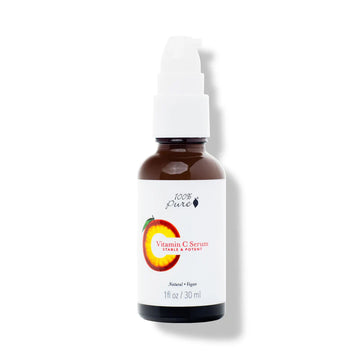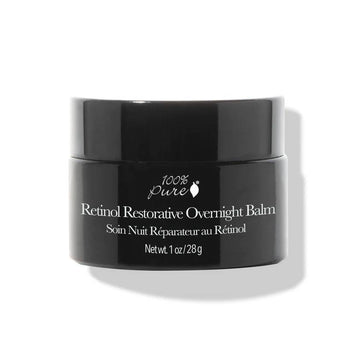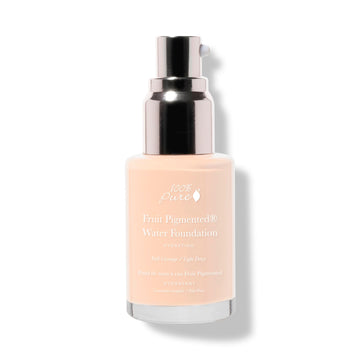Illuminate Your Way to Radiant Skin: The Power of LED Light Therapy
Posted on September 05, 2024 Written by: 100% PURE®
We’ve all been there–spending countless hours and dollars chasing that elusive “perfect skin.” Whether it’s acne, fine lines, or hyperpigmentation, we turn to every serum, mask, and treatment hoping that this will be the one that transforms our skin.
The problem?
Professional treatments are often expensive, time-consuming, and require frequent visits to a dermatologist or spa. But what if you could achieve those same professional-level results without stepping out of your home?
Enter LED light therapy.
LED light therapy is a treatment that’s been trusted by dermatologists and estheticians for years–one that can target multiple skin concerns with a single device, and doesn’t require invasive procedures or harsh chemicals. LED light therapy has been clinically proven to treat acne, reduce wrinkles, diminish dark spots, and even out skin tone. By harnessing the power of different wavelengths of light, these devices penetrate the skin at various depths to target specific issues at their root.
Transform your daily skincare routine into a high-tech self-care ritual. With just a few minutes of use a day, LED therapy can deliver lasting results, building healthier, more resilient skin over time. Whether you’re looking to maintain your skin’s current condition or reverse signs of aging, LED light therapy at home is changing the game by offering a powerful, non-invasive way to take control of your skin’s health and radiance.
Curious about how this technology works, what benefits it brings, and how to choose the right device and skincare products to enhance your results? We’ll dive into everything you need to know to get started with LED light therapy at home.
Understanding LED Light Therapy
LED (Light Emitting Diode) light therapy is a non-invasive treatment that uses different wavelengths of light to target specific skin concerns. Originally developed by NASA to help plants grow in space, this technology has been adapted for skincare, harnessing the healing properties of light to rejuvenate and repair the skin. Unlike UV rays, which can damage the skin, LED light therapy is safe and effective, providing a gentle way to improve your complexion without downtime or side effects.
The Science Behind Different Light Colors and Their Skin Benefits
Not all light is created equal when it comes to skincare. Each color of LED light penetrates the skin at different depths, triggering various biological processes that address distinct skin issues:
-
Red Light:
Known for its anti-aging benefits, red light penetrates deeply into the skin to stimulate collagen and elastin production. This can help reduce the appearance of fine lines and wrinkles, improve skin texture, and promote a more youthful glow. -
Blue Light:
Ideal for acne-prone skin, blue light targets the surface layer to kill acne-causing bacteria, reducing breakouts and preventing future ones. It’s a gentle yet powerful way to clear the skin without the harshness of traditional acne treatments. -
Near-Infrared Light:
Invisible to the human eye, near-infrared light goes even deeper than red light, enhancing circulation and reducing inflammation. It accelerates the skin's healing process, helps fade scars, and promotes a more even skin tone. -
Green Light:
Used for hyperpigmentation and sunspots, green light calms the skin and reduces melanin production, helping to lighten dark spots and even out the complexion.
So, how does a shining light on your skin create such powerful results?
It all comes down to how light interacts with your cells.
When LED light penetrates the skin, it reaches your cells’ mitochondria (yes, the powerhouse of the cell), boosting their activity and energy production. This process, known as photobiomodulation, increases cellular regeneration and repair, accelerates the healing of damaged tissues, and promotes a healthier, more resilient skin barrier.
By enhancing these cellular processes, LED therapy helps your skin heal from within, providing long-term benefits that go beyond the surface. Whether you’re looking to clear up acne, reduce wrinkles, or even out your skin tone, LED light therapy can be a game-changing addition to your skincare routine.

Benefits of LED Light Therapy
If you’re looking for a single treatment that can tackle multiple skin concerns, LED light therapy may be the answer you’ve been searching for. This powerful, non-invasive technology offers a range of benefits that can transform your skin from the inside out. Here’s how LED light therapy can make a difference in your skincare routine:
Acne Reduction and Prevention
Say goodbye to stubborn breakouts with the acne-fighting power of blue LED light. Blue light targets the surface of the skin, penetrating just enough to eliminate acne-causing bacteria without damaging the skin itself. It doesn’t stop there—this treatment also reduces oil production, helping to prevent future breakouts and giving you clearer, more balanced skin over time. Regular use of LED light therapy can reduce the frequency and severity of acne, providing a gentle and effective alternative to harsher treatments.
Anti-Aging Effects and Collagen Stimulation
Looking to reduce the appearance of fine lines and wrinkles? Red LED light is your new best friend. By stimulating collagen and elastin production, red light therapy helps to firm and plump the skin, smoothing out those pesky lines and wrinkles. The result is a more youthful, radiant complexion that feels just as good as it looks. With consistent use, LED light therapy can help maintain your skin's elasticity and reduce the visible signs of aging, keeping your skin looking fresh and vibrant.
Skin Rejuvenation and Improved Texture
Rejuvenate your skin with the combined power of red and near-infrared light. These wavelengths promote increased blood flow and cellular turnover, leading to healthier skin cells and a more even skin tone. LED light therapy can improve overall skin texture, reduce roughness, and give your complexion a smoother, more refined appearance. The gentle, non-invasive nature of LED therapy means you can enjoy these benefits without the downtime associated with more aggressive treatments.
Reduction of Inflammation and Redness
If you struggle with redness, irritation, or conditions like rosacea, LED light therapy offers a calming solution. Near-infrared light penetrates deeply to soothe inflammation and reduce redness, promoting a more even skin tone. This anti-inflammatory effect helps strengthen the skin's barrier, making it more resilient against external stressors. Regular use can help your skin feel calmer, healthier, and less reactive to the environment.
Enhanced Product Absorption
Did you know LED light therapy can also boost the effectiveness of your skincare products? By increasing circulation and opening up your pores, LED light enhances the absorption of serums, moisturizers, and other products you apply afterward. This means you get more bang for your buck, with skincare products penetrating deeper into your skin to work more effectively. It’s the perfect complement to your existing skincare routine, maximizing the benefits of every product you use.
Choosing the Right LED Device for Home Use
Ready to bring the benefits of LED light therapy into your home? With so many options available, choosing the right device can feel overwhelming. But don't worry—by understanding the types of devices, their key features, and what makes them safe and effective, you can find the perfect LED device to achieve your skincare goals.
When it comes to at-home LED light therapy, you have a few different options, each with its own benefits:
LED Masks: These hands-free devices are designed to cover the entire face, delivering even light exposure to all areas of the skin. They’re perfect for those who want comprehensive treatment for multiple concerns, like acne, fine lines, and hyperpigmentation. Simply put it on, relax, and let the mask work its magic.
LED Wands: For targeted treatment, LED wands allow you to focus on specific problem areas, such as fine lines around the eyes or stubborn acne spots. These devices are portable and easy to maneuver, making them ideal for spot treatments or on-the-go use.
LED Panels: Panels provide a larger surface area and are often adjustable to target not only the face but also the neck, chest, and other parts of the body. If you’re looking for a more versatile option that can address multiple concerns in different areas, panels offer maximum flexibility.
Understanding the types of devices available will help you choose one that fits your specific needs and lifestyle.
When selecting an LED device, look for these essential features to ensure you’re making a smart investment:
Multiple Light Settings: Opt for a device that offers various light colors—like red, blue, and near-infrared—to target a range of skin concerns. This versatility allows you to customize your treatment and maximize results.
Adjustable Intensity Levels: Devices with adjustable intensity levels give you more control over your treatment, allowing you to start at a lower setting and gradually increase as your skin adjusts.
Hands-Free Design: If you want convenience, choose a device that allows for hands-free use, like a mask or a panel. This way, you can continue with other activities while treating your skin.
Timer Settings: Built-in timers ensure you don’t overuse the device, helping to keep treatments safe and effective.
The effectiveness of an LED device largely depends on its light intensity and wavelength. For home use, it's important to find a device with a light intensity strong enough to penetrate the skin effectively but still safe for regular use. Look for devices with wavelengths in the range of 630-850 nanometers; this range covers the most effective therapeutic lights for skin concerns. A device with a higher number of LED lights or higher energy output typically delivers better results, but it’s also important to ensure it’s gentle enough for everyday use.
Safety is also crucial when using any at-home skincare device. Here are a few key considerations:
FDA Approval or Certification: Look for devices that are FDA-approved or have other safety certifications. This ensures that the device meets stringent safety standards for at-home use.
Eye Protection: Some devices emit bright light that could be harmful to your eyes, so choose one that comes with built-in eye protection or includes safety goggles.
Start Slow: Begin with shorter sessions on the lowest intensity to see how your skin reacts. Gradually increase as needed, but avoid overuse, which can lead to irritation.
Follow Instructions: Always follow the manufacturer’s guidelines on usage frequency and duration to minimize the risk of side effects and maximize benefits.
Incorporating LED Therapy into Your Skincare Routine
Once you’ve chosen the right LED device, the next step is to seamlessly incorporate LED therapy into your skincare routine for the best possible results. Knowing how often to use it, the optimal times for treatments, and how to prepare your skin will help you get the most out of your at-home LED sessions.
How Often to Use LED Therapy
Consistency is key to seeing results with LED light therapy. For most skin concerns, it’s recommended to start with three to five sessions per week for the first four to six weeks. As your skin begins to show improvements, you can reduce the frequency to one to two sessions per week to maintain the benefits. Remember, LED therapy is gentle and non-invasive, so you can adjust the frequency based on your skin’s needs and response.
Best Times of Day for Treatments
Finding the right time for your LED therapy sessions can make all the difference. Many people find that using LED therapy in the evening is ideal, as it allows them to relax and unwind while the treatment works its magic. Plus, evening sessions give your skin time to rest and repair overnight. However, if your mornings are calmer, using LED therapy after cleansing and before applying your skincare products can be equally effective. The best time is when you can commit to regular use, so choose what fits seamlessly into your daily routine.
Preparing Your Skin for LED Therapy
Preparing your skin properly before each session helps enhance the effectiveness of the treatment. Start by cleansing your face to remove any makeup, dirt, and oil that could block the light from penetrating the skin. Use a gentle, non-abrasive cleanser that doesn’t leave a residue. Avoid using any products containing retinoids or acids right before LED therapy, as these can make the skin more sensitive to light.
Pat your skin dry, and consider applying a hydrating serum with ingredients like hyaluronic acid or niacinamide. These can boost hydration and soothe the skin, creating the perfect foundation for your LED session. Some LED devices also work well with light-activated serums specifically designed to enhance the therapy's effectiveness.
Complementary Skincare Products to Enhance Results
To maximize the benefits of LED light therapy, pair it with complementary skincare products that target your specific concerns:
For Acne-Prone Skin: Look for products containing salicylic acid or benzoyl peroxide to keep pores clear and minimize breakouts. Follow with a calming serum containing aloe vera or green tea extract to soothe any potential redness.
For Anti-Aging: Combine LED therapy with a serum rich in peptides, vitamin C, or collagen-boosting ingredients to enhance firmness and elasticity. Follow up with a nourishing moisturizer to lock in hydration and support skin barrier function.
For Hydration and Brightening: Use a serum with hyaluronic acid or niacinamide to hydrate and even out skin tone. Apply a lightweight moisturizer that complements your skin type to seal in moisture and keep your complexion radiant.
To protect your skin, always follow your LED therapy sessions with a broad-spectrum sunscreen in the morning. This is especially important if you use red or near-infrared light, as it can make your skin temporarily more sensitive to the sun.
Targeting Specific Skin Concerns with LED Colors
One of the most powerful aspects of LED light therapy is its ability to target specific skin concerns by using different colors of light. Each color penetrates the skin at different depths, activating unique cellular processes that address a range of issues. Let’s explore how different LED colors can help you achieve your skin goals.
Red Light: Anti-Aging and Collagen Production
Red light is the go-to for combating signs of aging. Penetrating deep into the skin, red light stimulates collagen and elastin production, the proteins responsible for keeping your skin firm and youthful. As collagen levels increase, fine lines and wrinkles begin to smooth out, and skin elasticity improves. The result? A rejuvenated complexion with a more lifted, youthful appearance. Red light is perfect for anyone looking to diminish the visible signs of aging while promoting a healthy, radiant glow.
Blue Light: Acne and Oil Control
Struggling with acne or oily skin? Blue light can be a game-changer. This light targets the surface of the skin, where it combats acne-causing bacteria without harming the skin itself. By eliminating these bacteria, blue light reduces active breakouts and prevents future ones. Additionally, it helps to regulate oil production, making it a great choice for those with oily or acne-prone skin. Incorporating blue light into your routine can lead to a clearer complexion and fewer breakouts over time.
Green Light: Pigmentation and Skin Tone
If uneven skin tone, dark spots, or hyperpigmentation are your main concerns, green light therapy offers a targeted solution. Green light penetrates the skin to reduce melanin production, which helps fade pigmentation issues and creates a more even complexion. It also has a calming effect on the skin, reducing redness and soothing irritation. Regular use of green light therapy can result in a brighter, more uniform skin tone, giving you the confidence to go makeup-free.
Yellow Light: Redness and Inflammation
For those dealing with redness, sensitivity, or inflammation, yellow light is the answer. This wavelength reaches deep into the skin to calm irritation and reduce redness, making it ideal for conditions like rosacea or sensitive skin types. Yellow light also stimulates lymphatic drainage and improves blood circulation, which can help detoxify the skin and promote a healthy, glowing complexion. By incorporating yellow light therapy into your routine, you can enjoy a more balanced and less reactive skin environment.
Near-Infrared Light: Deep Healing and Rejuvenation
When it comes to deep healing and overall skin rejuvenation, near-infrared light is unmatched. This invisible light penetrates the deepest layers of the skin, stimulating cellular repair and promoting new cell growth. It boosts circulation and reduces inflammation, helping to speed up the healing process for scars, sun damage, and other skin concerns. Near-infrared light is perfect for anyone looking to rejuvenate their skin from the inside out, resulting in a healthier, more resilient complexion.
By selecting the right LED color for your unique skin concerns, you can create a customized, targeted treatment plan that works specifically for you. Whether you’re looking to reduce acne, fight signs of aging, or even out your skin tone, LED light therapy offers a solution tailored to your needs—right from the comfort of your home.

Maximizing Results from Your LED Therapy
To get the most out of your at-home LED light therapy, it's crucial to approach it with a strategic mindset. By following a consistent treatment schedule, integrating complementary skincare treatments, managing your expectations, and tracking your progress, you can enhance the effectiveness of your LED therapy and achieve your desired results.
Consistency is Key: Creating a Treatment Schedule
Consistency is the cornerstone of effective LED light therapy. For optimal results, incorporate your LED sessions into your daily or weekly skincare routine. Most devices recommend using them 3 to 5 times a week but be sure to follow the specific instructions provided with your device. Consistency helps maintain the skin’s cellular processes activated by the light, leading to more noticeable and long-lasting improvements. Set a reminder or schedule your treatments at a specific time each day to build a habit and ensure you don’t miss a session.
Combining LED Therapy with Other Skincare Treatments
To amplify the benefits of LED therapy, consider combining it with other skincare treatments. Here are a few ways to integrate LED therapy into your routine effectively:
-
Exfoliation: Use gentle exfoliants to remove dead skin cells before your LED session, allowing for better light penetration and more effective results. Avoid harsh scrubs or chemical peels immediately before or after therapy to prevent irritation.
-
Serums and Moisturizers: Apply serums and moisturizers after your LED session to maximize their absorption. Ingredients like hyaluronic acid, vitamin C, and peptides can be particularly beneficial when paired with LED therapy.
-
Sunscreen: Protect your skin with sunscreen during the day, especially if you’re using active ingredients like retinol. This helps shield your skin from UV damage and supports overall skin health.
By combining LED therapy with these complementary treatments, you can address multiple skin concerns simultaneously and enhance the overall effectiveness of your regimen.
Managing Expectations: Timeline for Visible Results
Understanding that visible results from LED therapy take time is essential for staying motivated and achieving your skincare goals. While some improvements, such as reduced redness or inflammation, may be noticeable within a few weeks, more significant changes like improved texture or reduced fine lines typically take 8 to 12 weeks of consistent use. Be patient and avoid the temptation to increase the frequency or intensity of treatments in hopes of faster results, as this can lead to irritation. Instead, focus on the long-term benefits and celebrate incremental progress along the way.
Tracking Your Progress with Photos and Skin Assessments
To keep track of your progress and stay motivated, consider documenting your journey with regular photos and skin assessments. Take before-and-after photos in consistent lighting and from the same angles to objectively compare changes over time. Additionally, perform periodic skin assessments to evaluate improvements in texture, tone, and overall appearance. This not only helps you see the benefits of your LED therapy but also allows you to make any necessary adjustments to your treatment routine.
By adhering to a consistent schedule, integrating LED therapy with other skincare treatments, managing your expectations, and tracking your progress, you can make the most of your at-home LED light therapy and achieve healthier, more radiant skin.
100% PURE Products to Enhance Your LED Therapy
Now that you’ve chosen your LED device and learned which light colors target specific skin concerns, it’s time to maximize your results with the right skincare products. Incorporating high-quality products into your routine can help amplify the benefits of LED light therapy, supporting your skin’s health and enhancing its appearance. Here are some top picks from 100% PURE to take your LED therapy to the next level.
Fruit Pigmented® Full Coverage Water Foundation: For a Flawless Base Post-Treatment
After an LED therapy session, you want a foundation that not only provides coverage but also lets your skin breathe. The Fruit Pigmented® Full Coverage Water Foundation offers a natural finish while nourishing the skin with hydrating ingredients. Made with fruit pigments and aloe juice, it provides a dewy, radiant look without clogging pores. This foundation is ideal for post-treatment use, allowing you to showcase your glowing skin while maintaining a fresh, healthy base.
Retinol Restorative Overnight Balm: To Amplify Anti-Aging Effects
Pairing red LED light therapy with the Retinol Restorative Overnight Balm can help you achieve even more dramatic anti-aging results. This balm is formulated with vegan retinol, which works overnight to boost cell turnover, reduce fine lines, and improve skin texture. After your LED session, apply this rich balm to support collagen production and wake up to visibly firmer, smoother skin.
Vitamin C Serum: For Enhanced Brightening and Protection
To amplify the brightening effects of your LED therapy, add the Vitamin C Serum to your routine. Packed with stabilized vitamin C and green apple extract, this serum targets hyperpigmentation and promotes a more even skin tone. Applying it after a session of green or red LED light therapy helps protect the skin against environmental damage and enhances the brightening benefits, giving you a glowing complexion that lasts.
Tea Tree & Willow Clarifying Astringent: To Support Acne-Fighting Benefits
If you’re using blue light therapy to combat acne, follow up with the Tea Tree & Willow Clarifying Astringent. Formulated with tea tree, willow bark, and witch hazel, this astringent helps purify the skin and maintain oil balance, reducing the risk of breakouts. It complements blue light therapy by continuing the fight against acne-causing bacteria and tightening pores, giving you clearer, smoother skin.
Hydra Drench Cream: For Deep Hydration to Complement LED Therapy
Hydration is key to supporting your skin’s health and enhancing the benefits of LED therapy. The Hydra Drench Cream provides deep hydration with natural ingredients like chia seed gel and rose water, which help to lock in moisture and soothe the skin. This lightweight yet nourishing cream is perfect for applying after any LED treatment, ensuring your skin stays hydrated and comfortable while it heals and regenerates.
By choosing the right skincare products to complement your LED light therapy, you can create a holistic routine that supports your unique skin goals. Each product works in harmony with your device to enhance its effects, providing visible results you can see and feel.
Conclusion
LED light therapy is revolutionizing how we care for our skin, making advanced, professional-level treatments accessible from the comfort of our homes. Whether you’re looking to reduce acne, minimize signs of aging, even out skin tone, or soothe inflammation, LED therapy offers targeted solutions for a wide range of skin concerns. By understanding how different light colors work, choosing the right device, and pairing it with effective skincare products, you can create a customized routine that empowers you to achieve your skin goals.
Remember, consistency is key. Incorporate LED therapy into your regular routine and follow best practices to maximize your results. Start with shorter sessions, gradually increase usage as your skin adjusts, and always follow up with nourishing products that complement your treatment.
Now, it’s time to take control of your skincare journey. With LED light therapy, you have the power to enhance your skin’s health and vitality in new and exciting ways. Embrace the journey to healthier, more radiant skin—one light treatment at a time.
The transformation starts with you. So, are you ready to shine brighter than ever before?
Frequently Asked Questions
How long does it take to see results from at-home LED light therapy?
The time it takes to see results from at-home LED light therapy varies depending on the individual and the skin concern being treated. Generally, most people notice initial improvements within 4 to 6 weeks of consistent use, with more significant changes visible after 8 to 12 weeks. For best results, follow the recommended usage guidelines for your device and incorporate LED therapy into your regular skincare routine.
Is LED light therapy safe for all skin types and conditions?
Yes, LED light therapy is generally safe for all skin types and tones. It is non-invasive, painless, and does not use UV light, so there is minimal risk of damage or irritation. However, if you have specific skin conditions, such as active rosacea or severe cystic acne, or are taking medications that make your skin more sensitive to light, it's best to consult with a dermatologist before starting LED therapy.
Can I use LED therapy if I'm using retinol or other active skincare ingredients?
Yes, you can use LED light therapy with retinol or other active ingredients like AHAs, BHAs, and vitamin C. In fact, combining these treatments can enhance their effects. However, to prevent potential irritation, it's best to use LED therapy and these active ingredients at different times of the day. For example, you can use LED therapy in the morning and apply retinol in the evening. Always follow up with sunscreen during the day, as some active ingredients can increase sun sensitivity.
How does at-home LED therapy compare to professional treatments?
At-home LED therapy devices are designed to be less powerful than professional treatments, making them safe for regular use without professional supervision. While professional treatments may provide faster or more dramatic results due to their higher intensity, at-home devices can still be highly effective when used consistently over time. For many people, at-home LED therapy offers a convenient and affordable way to maintain and enhance the benefits of professional treatments.
Are there any side effects or risks associated with LED light therapy?
LED light therapy is considered a very safe treatment with minimal side effects. Some users may experience mild redness, irritation, or dryness, especially if they have sensitive skin or use the device more frequently than recommended. These side effects are typically temporary and subside shortly after treatment. To minimize risks, follow the manufacturer’s instructions for your device and start with shorter sessions, gradually increasing as your skin adjusts.
- Tags: September-2024
We carefully hand-select products based on strict purity standards, and only recommend products we feel meet this criteria. 100% PURE™ may earn a small commission for products purchased through affiliate links.
The information in this article is for educational use, and not intended to substitute professional medical advice, diagnosis, or treatment and should not be used as such.













